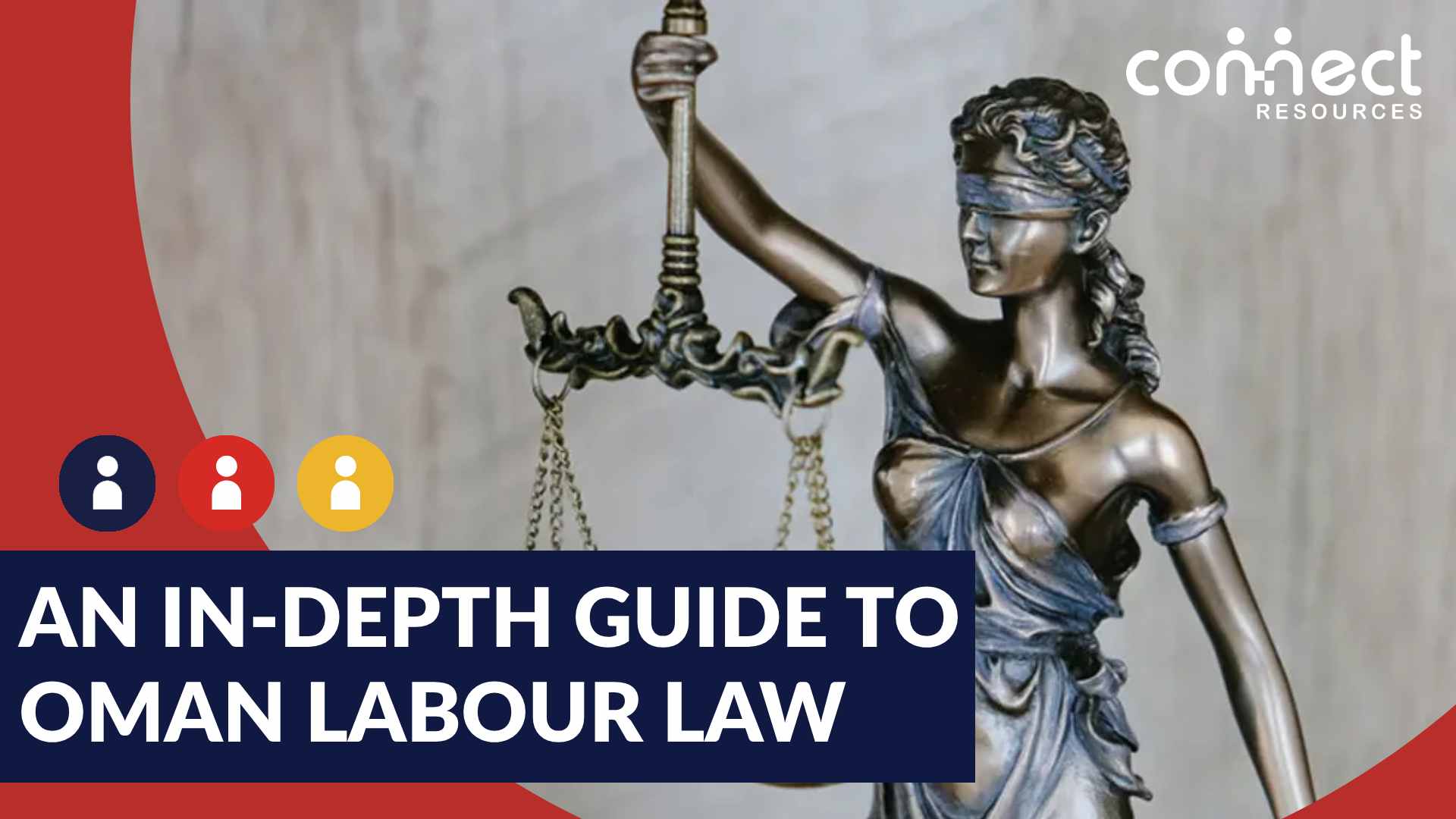Every private sector worker and employer in Oman has a duty to abide by the country’s labor laws. To maintain compliance, it is crucial to educate yourself on the provisions of the Oman labour law before beginning an employment relationship. In this way, both parties can know their rights regarding employment and abide by the authorities.
In this article, we will be navigating the employment regulations according to the Oman labour law. Labour laws in Oman are designated to protect the employment relationship between all sides involved. Therefore, it is essential to understand them and make sure to comply with these regulations. This, in order to establish a strong workplace atmosphere.
Dispute Resolution and Employee Rights
The second-biggest state in the GCC, the Sultanate of Oman, has a greater variety of natural assets than most other Gulf countries. Oman is a major player in the external trade of the Arabian Peninsula, and the country’s ongoing development is spreading by the private sector. Nearly 3 million people live in Oman, and around one-third of the labor force is made up of foreigners.
The Labour Law, issued pursuant to Sultani Decree 35/2003, including the many Ministerial decisions that update it. As well as the Civil Transactions Law, set pursuant to Sultani Decree 29/2013, both govern employment in Oman.
Except for domestic servants, the employment of every employee in the private sector is bound to the Ministry of Labour. It regulates employment agreements, salaries, overtime pay, paid time off, working conditions, workplace safety, labor disputes, and the hiring of Omani and overseas workers.
These are exempt:
- Personnel from the military forces, public security agencies, and state administration and other agencies of government.
- Family members of the company who sponsor or depend on the employee.
- Drivers, maids, cooks, and other household helpers who perform their work inside or outside of homes.
The company is free to create employee-beneficial programs, offer extra perks, or sign contracts with provisions that are better for the employee than those outlined in this law. If a provision of this law conflicts with any of the terms specific in such plans or deals, the provision that is more advantageous to the worker shall take precedence.
Employees from other countries are also bound by the Sultani Decree 16/1995-issued Law of Foreigners Residence as well as the rules and decisions taken by the Royal Oman Police on work visas and residence permits.
Key Provisions of Oman Labour Law
Unless it is more advantageous to the worker, any condition that conflicts with the provisions of this legislation must be void. Even if it existed before to its implementation.
Any release, settlement, or concession of rights originating under this law that conflicts with its terms is unlawful.
Conditions set forth by laws, rules, and decisions that were in effect at the time this law became operative and that are more favorable to the worker will continue to be upheld.
The company has no authority to impose any kind of forced or mandatory labour.
All employers and employees, as well as all types of businesses and their domestic and foreign branches that conduct business in the Sultanate, if they are private or public, including domestic and foreign institutions of private education, must abide by the provisions of this law unless specifically exempted by a special provision.
The employer may create programs through which his employees can receive benefits that are better than those that are obligatory. Also, offer them additional benefits or engage into agreements with them that have terms that are better than those necessary by law.
If a provision of this law conflicts with any provision of such schemes or agreements, the one that is most advantageous to the employee shall apply.
Working Hours and Overtime
The regular working week for the employees cannot be longer than 45 hours. There is a nine-hour daily cap. For Muslim workers, the maximum amount of work throughout Ramadan is 6 hours per day, or 30 hours per week.
If the business necessitates it, a worker may work longer hours. Twelve hours a day, plus three hours of overtime, might be added to the total working time. Additionally, an employee may agree to work on a holiday or a day off. An employer may require a worker to put in overtime under particular, specific conditions. And a rejection would result in disciplinary action. Overtime is any hour that is longer than the statutory allotments for regular working hours.
When an employee is requested to perform overtime during the workweek or on a holiday, they either:
- Receive time off in lieu of the overtime or
- They receive a salary at the rate of their basic wage plus 25% during the day and 50% during the night. With double salaries if the work occurs on a weekday off or a holiday.
In all situations, time in lieu of notice or payment of overtime rates must be agreed to in writing by both the employer and the employee.
Women cannot go to work before 6 am or after 9 pm without the Ministry of Manpower’s (MOM) permission.
Less than 18-year-old juvenile employees have no right to work between 6 a.m. and 6 p.m. or for over six hours per day.
They cannot work for longer than seven hours straight. Also, breaks for rest and meals must happen at least once during the working hours, with a maximum break time of one hour.
Juveniles cannot work overtime or on weekends or public holidays due to the Oman labour law.
Termination and Dismissal
According to the Oman Labour Law in certain situations, a company can end a labor agreement without giving notice and without paying a gratuity at the conclusion of employment on the basis of gross misconduct. Unless a longer period exists in the employment contract, the requisite notice period for terminating an indefinite-term contract is 15 days in all other circumstances plus a month where the worker gets a monthly income. An employment contract cannot be terminated by an employer without justification.
The employee may file a labor complaint at the Ministry where arbitration takes place if the company does not have a valid defense. The claim goes to court if the Ministry is unable to resolve it. Three months’ worth of gross salary is the bare minimum of compensation that must be paid in wrongful termination situations.
Employees can obtain employment on fixed-term agreements that end on a certain date or at the conclusion of a particular assignment with no requirement for termination. Likewise, companies must pay for foreign repatriation at the end of their employment.
If an employer terminates an employee without giving them a reason, this is arbitrary. Even if the reason is pertaining to the work. If it appears to the court that the employee’s termination of employment or dismissal was unfair or in violation of the law, they may:
- Reinstate the worker or,
- Order the company to pay reimbursement equal to at least three months of their last full salary. Taking into account their conditions and length of service, as well as:
- All other benefits in the law or the employment agreement. As well as any end-of-service gratuity that the employee is legally eligible.
- The basic wage plus any additional benefits for the length of notice mandatory by law or the employment contract.
Social Security and Employee Benefits
If an Omani employee has a permanent employment contract and is working in the private sector, the requirements of this article will apply, providing that the employee is at least 15 years old and is not older than 59. The MOM will decide when the terms of this law go into effect, although foreign employees, people working in simple trades, and domestic staff are exempt.
The clause shall be applicable to:
- Insurance against death, incapacity, and aging.
- Insurance against workplace diseases and accidents.
The insurance contributions specific in this law shall be according to the insured person’s wage. The contribution for a worker who is paid hourly, piecewise, or both shall be determined using the average wage for that worker’s actual work over the previous three months. The covered person’s monthly salary cap is 3000 Rial Omani, subject to contribution.
The employee will be eligible to receive both the end-of-service gratuity and any pension benefits due to them if they make contributions to such a fund.
According to employment rights in Oman:
- If there are more than 100 employees, the company must hire an official nurse to perform first aid. The business will provide healthcare for the employees at the workplace.
- The company must also appoint a physician to see the workers, treat them at a proper facility, and provide the workers with the free medications they require for treatment.
- If there are more than 500 employees, the company will give the workers access to specialized doctors, surgical procedures, and the required medications. With the major exception of dental, ophthalmology, and maternity care, all of which are complimentary.
- Employers must ensure that their staff members have access to proper transportation. Lodging that meets their needs, food, and clean water within easy reach.
Employment of Nationals and Expatriates
The Oman labour law implemented the Omanisation policy in 1988 with the intention of substituting Omani citizens for foreign labor. In Oman, particular percentages of Omani to outside personnel have been set for a number of industries. And businesses that meet the requirements are obtain green card that gives them preferential treatment in any government project.
The proportion of Omani workers alongside foreigners in various economic sectors will be determined by a decision by the Ministry of Manpower (MOM). This, depending on the demands and scope of each industry or the availability of the necessary Omani workers.
In order to give Omani citizens the chance to apply for such positions, the MOM is imposing a visa prohibition on foreign workers in the private sector for particular employment roles, such as:
- Sales.
- Marketing.
- IT.
- Accounting.
- Finance.
- Management roles.
- Human resources.
- Insurance.
- Media.
- Airport relations.
- Engineering.
Any Omani who is able to work and chooses to do so should file their name with the appropriate directorate. Consequently, provide the Ministry with information regarding their age, education, and experience.
In exchange, the directorate will register the applications with serial numbers as soon as it receives them.
Regarding hiring Omanis, the Directorate will commit to taking the following actions:
- Possess thorough knowledge of all open positions, occupations, and employer-required requirements.
- If workers have the necessary credentials, direct them to jobs and occupations.
- Assist candidates with training and direction to make it easier for them to register for open positions.
Within one month of the date the position becomes empty, businesses must notify the department in writing of all open positions and occupations. This, together with the remuneration for each position and the date set for its occupation.
Succession Planning in a Multinational Workforce
When it comes to broad objectives, succession planning for a remote workforce is similar to traditional succession planning in certain aspects.
A typical a succession strategy examines numerous firm positions and the logical candidates to take over those positions. These individuals will require the necessary training. This, to assume the new positions, if and when necessary.
Making that plan and carrying it out require special abilities. The following five factors are essential for effective succession plans:
- Identify the key positions within your firm. Verify that these positions remain in effect if a plan has previously been in place.
- Determine the qualifications necessary for the position. Making sure that job descriptions are present is the first step because they are really advantageous. Include any skills you decide are essential moving ahead but may not have been part of the function when it first came into being.
- Match the right positions with the right candidates. Internal applicants benefit from familiarity with the company and its processes. Additionally, they have a track record of success, which an outside applicant does not.
- Be tolerant. Ensure that the team knows the strategic plan for succession. Their suggestions and opinions may be helpful.
- Adopt a developmental training strategy. Follow through with the plan by preparing candidates with leadership courses and training in the particular abilities they may require.
Although the steps remain the same, the execution does. As we see, the transition to a WFH context necessitates changes for every step. These adjustments might range in size from modest to substantial.
It is essential to have in mind that Oman labour rights and duties must always come first when employing individuals. If you want to read more Oman labour law updates, you can go to our insights section.










